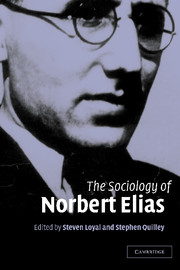Book contents
- Frontmatter
- Contents
- List of contributors
- Acknowledgements
- 1 Towards a ‘central theory’: the scope and relevance of the sociology of Norbert Elias
- Part I Sociology as a human science: Norbert Elias and the sociology of knowledge
- 2 From distance to detachment: knowledge and self-knowledge in Elias's theory of involvement and detachment
- 3 Ecology, ‘human nature’ and civilizing processes: biology and sociology in the work of Norbert Elias
- 4 Between the real and the reified: Elias on time
- Part II Processes of stratification: figurations of race, class and gender
- Part III The formation of individuals and states
- Part IV Religion and civilizing processes: Weber and Elias compared
- Index
- References
2 - From distance to detachment: knowledge and self-knowledge in Elias's theory of involvement and detachment
Published online by Cambridge University Press: 22 September 2009
- Frontmatter
- Contents
- List of contributors
- Acknowledgements
- 1 Towards a ‘central theory’: the scope and relevance of the sociology of Norbert Elias
- Part I Sociology as a human science: Norbert Elias and the sociology of knowledge
- 2 From distance to detachment: knowledge and self-knowledge in Elias's theory of involvement and detachment
- 3 Ecology, ‘human nature’ and civilizing processes: biology and sociology in the work of Norbert Elias
- 4 Between the real and the reified: Elias on time
- Part II Processes of stratification: figurations of race, class and gender
- Part III The formation of individuals and states
- Part IV Religion and civilizing processes: Weber and Elias compared
- Index
- References
Summary
‘Detachment’ and ‘involvement’ belong to the not very large group of specialized concepts referring to the whole human person.
(Norbert Elias 1987: xxxii)Introduction: after Weber
Max Weber famously declared that the vocation of sociology requires that sociologists should suspend certain values in the pursuit of the ideal of ‘value-freedom’. It is obvious reading Elias's first systematic statement of his theory of involvement and detachment (Elias 1956) with Weber in mind, that on the subject of science and values, although he departs from Weber in significant ways he, too, must have been stimulated by Weber's observations. In common with many other social scientists outside Marxist circles in Weimar Germany, early in his career Elias probably acquiesced in the all-pervasive Weberian position on value-freedom (or some version of it) as a set of working principles for social-scientific work. Indeed, it was partly this broad orientation which set the sociology department of Mannheim and Elias in Frankfurt apart from the subsequently more famous ‘Frankfurt School’ of Adorno and Horkheimer with whom they shared a building (Shils 1970; Bogner 1987; Mennell 1998: 15). In a Marxian manner the latter group emphatically rejected value-freedom in any form because they saw it as part of a positivistic ideology in social science that excluded partisanship on behalf of the underprivileged (Kilminster 1979: 195–201).
I think it is possible to breathe further life into this venerable subject of value-freedom through understanding how Elias took the Weberian model as a point of departure.
- Type
- Chapter
- Information
- The Sociology of Norbert Elias , pp. 25 - 41Publisher: Cambridge University PressPrint publication year: 2004
References
- 19
- Cited by



